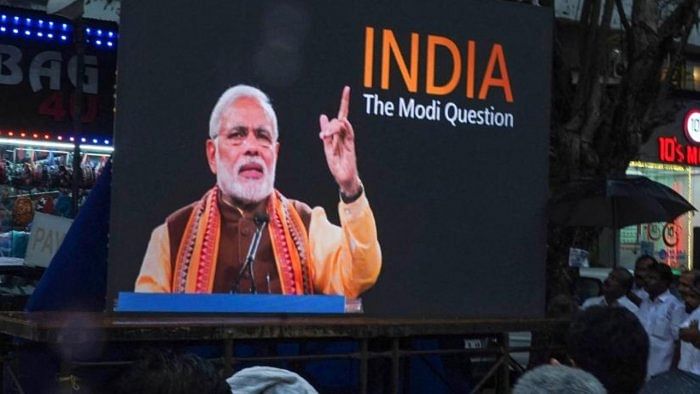
More puzzling than the timing of the airing of the two-part BBC documentary, 'India: The Modi Question', is that it triggered the Narendra Modi government to ask social media platforms, Twitter and YouTube, to delete tweets and block uploads.
Does the government fear it would dent the PM's image as the country prepares to host the G20 summit, or might it hurt the BJP, especially among the youth - too young or not born in 2002 to remember the events in Gujarat - in the Lok Sabha elections in 2024?
On January 21, India's External Affairs Ministry termed the documentary biased, lacking objectivity, and exemplifying continuing colonial mindset. A statement by 302 former bureaucrats, judges and veterans said the documentary symbolised the British imperialist hangover. Hindutva votaries had exulted in October when Rishi Sunak, a practising "proud Hindu", took oath as UK's prime minister on the Bhagavad Gita. After the documentary was released, they quickly dug up past instances of BBC's "colonial mindset" on social media. If anything, the BBC documentary, and the subsequent comments on immigration from India by his ministers, have helped Sunak.
Also Read | An era of e-Emergency?
When Pakistani-origin Bradford East MP Imran Hussain asked Sunak if he agreed with claims in the BBC programme that some UK Foreign Office diplomats believed that "Modi was directly responsible", the British PM sought to placate Muslims and Hindus. "The UK government's position on that is clear and long-standing, and it has not changed. Of course, we do not tolerate persecution anywhere, but I am not sure that I agree at all with the characterisation that the hon. gentleman has put forward," he said.
The other inference that Sangh Parivar is concerned with the documentary is unconvincing. On November 26, while campaigning for the Gujarat assembly polls, Union home minister Amit Shah, in reference to Muslims, said that "such a lesson was taught in 2002" to "those engaging in communal riots" in Gujarat that it led to "akhand shanti" (eternal peace) in the state under the BJP. In the aftermath of the riots, Modi emerged as the "Hindu hridaya samrat", the emperor of Hindu hearts, pitchforking him to the national stage within a decade.
Government officials said the Centre blocked the documentary on social media since it was an attempt to cast aspersions on the authority and credibility of the Supreme Court, which has given the PM a clean chit, sow divisions among various Indian communities, and make unsubstantiated allegations regarding the actions of foreign governments in India.
But BJP insiders attributed the response to assuaging the anger among Modi's supporters who believe the documentary is an attempt to insult him. They also pointed to the relatively benign treatment meted out to those who have attempted to screen the documentary publicly by the law and order machinery. They hinted how this was in contrast to the anti-CAA agitation. "It is an easy assumption for those who do not understand the Sangh Parivar that only a couple of people are omnipotent to take final and binding decisions. Such an assessment ignores that a cadre-based party, which we are, is also democratic where it should heed the sentiment of its rank and file," a party leader explained.